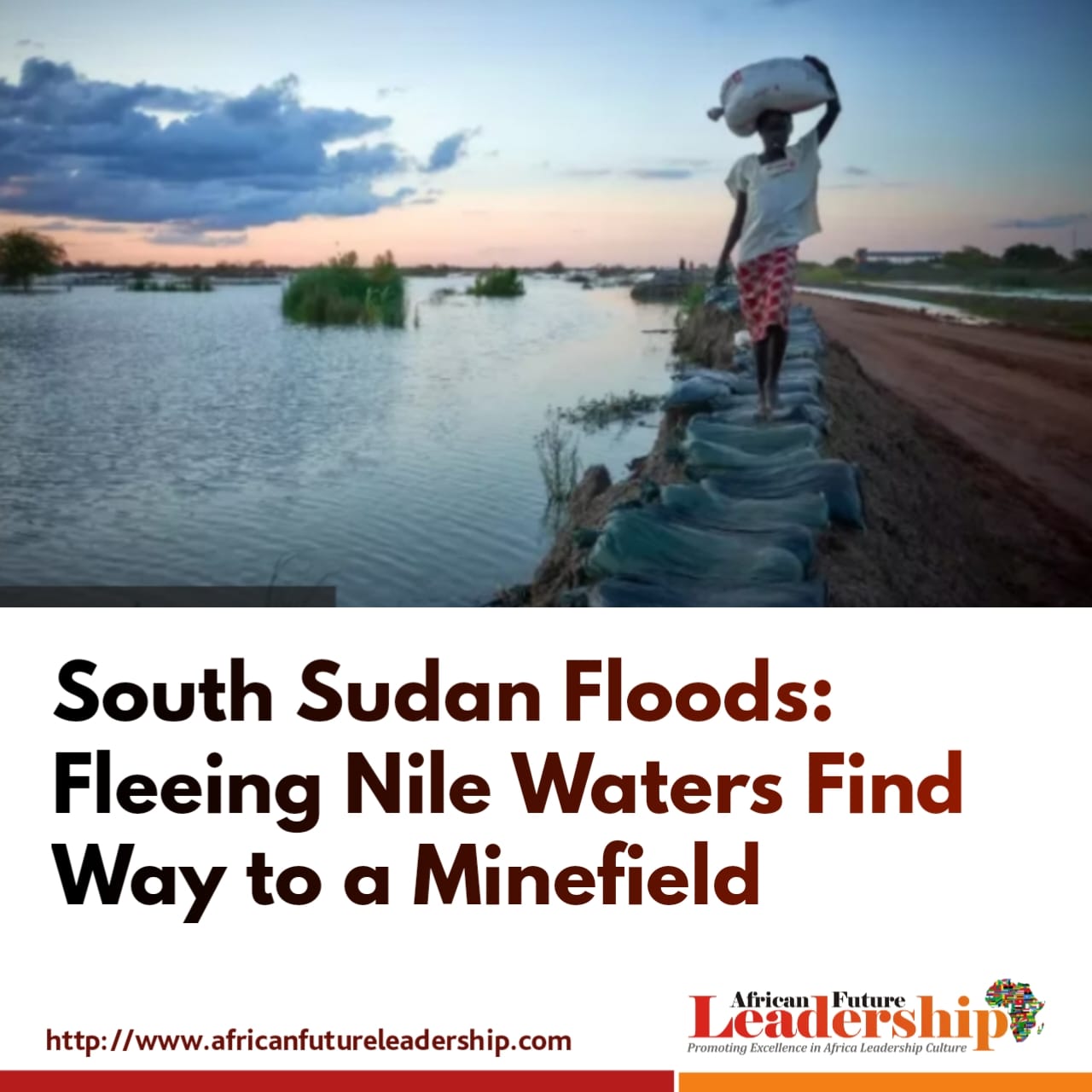By our Reporter
With the worst flooding in more than 50 years engulfing communities along the River Nile in South Sudan last year, thousands of people fled to higher ground, seeking refuge in an old army barracks.
Very well known as Canal Village, it had been a strategic military position decades ago in northern Jonglei state, with the city of Malakal further along the Nile. But its new residents discovered, to their dismay, that within its confines lay an old minefield.
In a sens, their predicament encapsulates the impact of a climate crisis on a country which is yet to recover from a brutal five-year civil war. A peace deal signed in 2018 has done little to stop endemic violence.
And those who had already been forced from their homes because of the conflict are again fleeing, with flooding, seen above near the town of Bentiu in Unity state, over the last four years becoming an increasing problem.
As a matter of fact, an estimated 2.2 million people, nearly 20% of the population, are internally displaced – with the UN warning that up to 10 million will need food aid in 2023.
This is why, in order to help her family escape the waters that engulfed her village, Mary Nyantey tied her five children up in sheets of plastic usually used to cover homes from the rain. She swam and floated down river for a day dragging her precious sack behind her until she reached Bentiu.
Interestingly, the family are now in a camp there, but have no food and go to the river to harvest a plant called “yell”, which is what they are eating to survive.
READ MORE: 2-year-old Ugandan Survives Hippo Attack
Meanwhile, the camp in Bentiu shelters more than 112,000 people and is erected on raised dykes. According to Joshua Kanyara, from the UN’s International Organization for Migration (IOM), the area is unique in that any dry land there, is thanks to these dykes, which are about 2.5m (8ft 2in) high and built by humanitarian groups.
Again, Gatkuoth Makal Kuir, was 19 years old when he arrived at the camp in 2014 after a four-day journey on foot, fleeing government troops who believed his village was supporting the opposition.
But now aged 27, he would like to go home, but does not feel he can support his wife and child if they go back because of the flooding. He spends his day looking for firewood, travelling great distances but the insecurity worries him, especially the reports that 30 youngsters playing football in a field near the camp were recently forcibly recruited by the army and died in fighting.
However, seventeen-year-old Nyawoura Dak Top (above), who had been living as a refugee in Kenya, came to this camp last year in search of her mother. She had been told her mother had died at the start of the conflict, but when she heard she may be in Bentiu, she came to look for her.
So, it was an emotional and joyous reunion and they now live together, but Nyawoura feels trapped in the camp, given the continuing floods. She would like to get an education but fears she will be pushed into an arranged marriage by her relatives.
In any case, while the flooding and torrential rain across 36 of South Sudan’s 79 counties, this made it impossible for people to return to agricultural sources of income, grazing for cattle – which are so important in terms of wealth and status – is also affected, leaving animals emaciated and many dead.
Of course, with so many people dependent on humanitarian aid – often brought in by plane – there is a sense of panic amongst camp residents in Bentiu given that funding for South Sudan has dropped to 67% of what is required.
This is why, “Humanitarians are everything. They are our god, our father, our food, our education, our shelter and our safety. Without them and the IDP camps all the people you see here would be dead,” says 80-year-old camp resident Diw Luong Peat.
For him as a prominent traditional leader, he has a large family with several wives. Since 2014 eight of his children have been killed in the conflict and 15 others have died of illnesses. On account of the insecurity, he does not feel safe to return home.
Furthermore, it is also dangerous for families, like those in Abyei, a town that borders Sudan, to be living and sleeping by giant pools of water.
For the Médecins in Sans Frontières, the stagnant water has contributed to a rise of malaria and water-borne illnesses, extreme malnutrition, more frequent snake bites and an increase in diabetes. The UN also points to repeated measles outbreaks.
In all, Abyei resident Dau Jach Chan, 58, is currently hosting two other families who lost their homes in the floods as there are not enough shelters for displaced people at a nearby hospital. With eight children of his own, he is now struggling to find food for all of them.
Therefore, for the new residents of Canal Village, there is now hope that they will be able to plant some crops. Earlier in the year, the UN’s demining team (Unmas) came to their rescue, clearing 17,000 sq m of land – finding more than 25 anti-personnel mines.
This emerging news was greeted with celebrations and the UN hopes the move will allow around 1,500 people to properly settle there.
By for Fran O’Grady from Unmas who stressed how precarious a situation many South Sudanese find themselves in, especially along this stretch of the Nile where intercommunal violence and banditry is rife.
“The population in Canal Village, host communities and the internally displaced sadly have nowhere else to go – for ethnic, previous conflict and land ownership reasons,” he said.
For the most, “If they were to seek shelter downriver in Malakal, for example, their lives could be at risk as soon as they stepped off a boat.”




